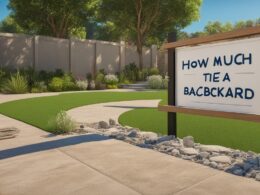Do you want to create a peaceful oasis in your backyard, but highway noise is interfering with your plans? Fortunately, there are several effective solutions you can use to reduce noise pollution in your outdoor space. Whether you’re looking to create a relaxing atmosphere for outdoor entertaining or simply want a quiet place to read a book, the following techniques can help you achieve your goals.
Read on to discover how to reduce highway noise in your backyard:
Key Takeaways
- Highway noise can interfere with your backyard plans, but there are several solutions to reduce noise pollution.
- By using natural barrier solutions, soundproofing techniques, and considering lifestyle and design factors, you can transform your outdoor space into a peaceful oasis.
- Implement these strategies today to enjoy a quieter and more tranquil backyard experience.
Understanding the Impact of Highway Noise
If you’re looking to reduce highway noise in your backyard, it’s important to understand the impact of noise pollution on your outdoor space. Noise pollution can cause a variety of negative effects, from disturbing your peace and quiet to impacting your health and well-being.
Highway noise is created by a combination of factors, including road surface type, traffic volume, and the speed and weight of vehicles passing by. This noise can travel for miles, affecting nearby residential areas.
To reduce the impact of highway noise on your backyard, there are several noise reduction measures you can take. These include creating physical barriers such as fences and walls, utilizing soundproofing materials, or incorporating natural elements like trees and plants to absorb sound waves.
Natural Barrier Solutions
If you’re looking for a natural way to reduce highway noise in your backyard, consider using landscaping techniques to create a natural buffer zone. By strategically placing plants, trees, and fences, you can create a barrier that minimizes the amount of noise pollution in your outdoor space.
Using Plants
Plants are an effective way to absorb noise and create a more tranquil environment in your backyard. Consider planting a combination of trees, shrubs, and hedges to form a natural sound barrier. Evergreen species are particularly effective at reducing noise levels, as they provide year-round coverage.
To maximize the effectiveness of your plants, consider using a combination of different species and planting them in a staggered pattern. This will help to create a denser barrier that can absorb more sound waves.
Building Fences
Fences are a classic way to create privacy and reduce noise in outdoor spaces. When it comes to blocking highway noise, a solid fence is more effective than a slatted one. Make sure your fence is at least 6 feet tall to create a sufficient barrier.
If you’re concerned about the appearance of a solid fence, consider using a combination of materials. For example, you could use brick or stone at the bottom, with wood or vinyl on top. This will create a fence that is both aesthetically pleasing and effective at reducing noise.
Combining Techniques
To maximize the effectiveness of your natural barrier, consider using a combination of planting and fencing techniques. For example, you could plant trees and shrubs along the edge of your property, and then install a fence behind them for additional noise reduction.
By combining these techniques, you can create a natural barrier zone that effectively minimizes highway noise in your backyard.
Soundproofing Techniques for Backyards
If natural barrier solutions aren’t sufficient, there are various soundproofing techniques that can help reduce noise pollution in your backyard. These methods can provide an additional layer of noise reduction to create a quieter outdoor environment.
Acoustic Panels: One effective soundproofing technique is the use of acoustic panels. These are specially designed panels made of sound-absorbing materials that can significantly reduce noise pollution. You can install these panels on walls, fences, or even as a standalone feature in your backyard.
Sound-absorbing Materials: Another option is to use sound-absorbing materials such as cork or fiberglass. These materials can be placed in strategic locations to absorb sound waves and reduce noise pollution. For example, you can place cork mats or fiberglass insulation in the gaps between fence panels.
Strategic Placement of Outdoor Furniture: Placing outdoor furniture strategically can also help create a quieter outdoor environment. For example, placing a large sofa or armchair against a fence can help absorb noise. Additionally, adding outdoor curtains, rugs, and pillows can also help deaden sound waves and reduce noise pollution.
White Noise Machines: White noise machines can help mask traffic noise by creating a continuous sound that can help drown out the offending noise. These machines emit a soothing sound that can blend with the surrounding noise and create a more pleasant outdoor experience.
By incorporating one or more of these soundproofing techniques in your backyard design, you can significantly reduce highway noise pollution and create a serene outdoor space that you can enjoy.
Lifestyle and Design Considerations
Aside from natural barriers and soundproofing techniques, lifestyle and design considerations can also help reduce highway noise in your backyard. Here are some ideas to consider:
- Rearrange outdoor spaces: Consider rearranging your outdoor furniture to create more distance between your seating area and the highway noise. Moving furniture away from the noise source can help reduce its impact.
- Water features: The sound of running water can have a calming effect and serve as white noise to drown out highway noise. Consider adding a fountain, waterfall, or pond to your backyard to create a peaceful atmosphere.
- White noise machines: White noise machines emit soothing sounds that can help mask highway noise. Place one near your outdoor seating area or sleep with one running in your bedroom to help reduce the impact of highway noise pollution.
By incorporating these lifestyle and design considerations, you can minimize the impact of highway noise on your backyard and create a more tranquil outdoor experience.
Can the Solutions for Reducing Highway Noise in Backyard Also Help Cover Up Mud?
Looking for quick backyard mud cover-up solutions? While solutions for reducing highway noise may not directly help with covering up mud, there are other options. Consider using landscaping techniques like gravel pathways or installing raised decking to create a dry and mud-free area. Additionally, using outdoor rugs or mats can also provide a temporary solution for hiding mud in your backyard.
Conclusion
Reducing highway noise in your backyard is essential to create a peaceful and relaxing outdoor environment. By implementing these effective solutions, you can minimize noise pollution and enjoy a tranquil oasis in your backyard.
Start by understanding the impact of highway noise, as this will help you choose the most suitable noise reduction measures for your backyard. Utilizing natural barriers, such as plants, trees, and fences, can significantly reduce noise levels. If these solutions are not sufficient, soundproofing techniques can provide an additional layer of noise reduction.
When considering lifestyle and design factors, rearrange outdoor spaces, incorporate water features, and use white noise machines to create a serene outdoor living area. By implementing these strategies, you can transform your backyard into a peaceful oasis.
Take Action Today
Implement these solutions today to enjoy a quieter, more tranquil backyard experience. Your neighbors and family will thank you for creating a peaceful outdoor environment that is free of highway noise pollution.
FAQ
Q: How can I reduce highway noise in my backyard?
A: There are several effective solutions to reduce highway noise in your backyard. You can utilize natural barrier solutions such as landscaping with plants, trees, and fences. Additionally, soundproofing techniques like acoustic panels and strategic placement of outdoor furniture can help create a quieter outdoor environment.
Q: Why is understanding the impact of highway noise important?
A: Understanding the impact of highway noise helps you make informed decisions about reducing noise levels in your backyard. Factors such as distance from the highway, traffic volume, and terrain can affect the effectiveness of noise reduction measures. It’s essential to consider these factors before implementing any solutions.
Q: How can natural barriers help in reducing highway noise?
A: Natural barriers such as plants, trees, and fences can create a buffer zone that minimizes noise pollution in your backyard. These barriers help absorb and block sound waves, reducing the impact of highway noise on your outdoor space and creating a more peaceful environment.
Q: What are some soundproofing techniques for backyards?
A: If natural barriers aren’t sufficient, soundproofing techniques can provide an additional layer of noise reduction. You can use acoustic panels, sound-absorbing materials, and strategic placement of outdoor furniture to help minimize highway noise in your backyard.
Q: Are there any lifestyle and design considerations to reduce highway noise?
A: Yes, lifestyle and design factors can help minimize the impact of highway noise in your backyard. Rearranging outdoor spaces, incorporating water features, and using white noise machines are some practical tips to create a serene outdoor living area that distracts from the noise and provides a more tranquil experience.









